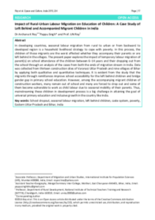Abstract
In developing countries, seasonal labour migration from rural to urban or from backward to developed region is a household livelihood strategy to cope with poverty. In this process, the children of those migrants are the worst affected whether they accompany their parents or are left behind in the villages. The present paper explores the impact of temporary labour migration of parent(s) on school attendance of the children between 6–14 years and their dropping out from the school through an analysis of the cases from both the ends of migration stream in India. Data was collected from thirteen construction sites of Varanasi Uttar Pradesh and nine villages of Bihar by applying both qualitative and quantitative techniques. It is evident from the study that the migrants through remittances improve school accessibility for the left behind children and bridge gender gap in primary school education. However, among the accompanying migrant children of construction workers, many remain out of school and many are forced to drop out and some of them become vulnerable to work as child labour due to seasonal mobility of their parents. Thus, mainstreaming these children in development process is a big challenge in attaining the goal of universal primary education and inclusive growth in the country like India.

